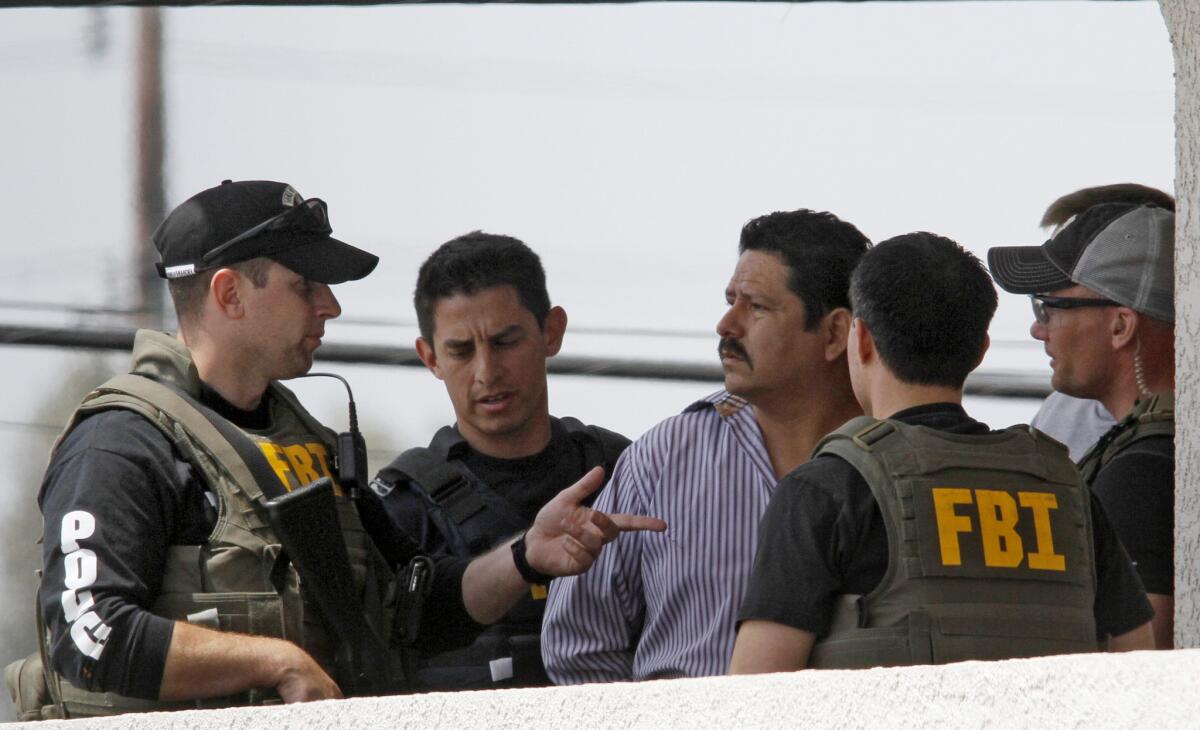Audit faults Cudahy as government in chaos

- Share via
When three city officials were arrested trying to shake down a marijuana dispensary owner, Cudahy was branded a town where bribes were routine and elections were rigged.
On Tuesday, state officials added one more indignity to Cudahy’s battered reputation: a city with a staggering inability to keep an eye on public funds.
In a damning audit, the state controller concluded that leaders in the working-class town used city-issued credit cards for excessive travel, meals and entertainment, mismanaged state funds and had virtually no internal controls to prevent the misuse of taxpayer dollars.
City-issued credit cards were used for expensive meals, entertainment and to cover thousands of dollars in hotel expenses in Indian Wells, San Diego and Sacramento. In one unexplained shopping trip, the city’s former city manager spent nearly $500 at “a Halloween club” and most months the city had to pay hundreds of dollars in late credit card fees.
“Very few controls or checks and balances existed to guard against corruption, abuse, and fiscal mismanagement,” Controller John Chiang said. “The few rules that did exist were not followed, and questionable spending was rampant.”
The audits portray a city government in chaos, where budgets were adopted months into the fiscal year, key documents disappeared, and the treasury steadily ran in the red.
The audits found that of the 79 standards of internal controls, the city used only eight.
The controller’s review found no written explanations for why employees’ salaries were increased or what the justification was for employees receiving “leave pay.”
The community services director, for example, accumulated an average of almost 59 days of leave a year. The city clerk received $38,210 of leave pay one year.
City officials treated themselves well when they traveled. In June 2009, the audit said, the former code enforcement director spent $859 at the Marriott Renaissance Resort in Indian Wells. In February 2012, a council member spent $560 for a two-night stay at the Marriott Marquis Hotel in San Diego.
With only 25,000 residents, Cudahy is the second-smallest city in Los Angeles County. Located next to Bell along the Los Angeles River, it has long been dogged by suspicions of corruption.
Two former Cudahy council members and the former head of code enforcement pleaded guilty last year to taking $17,000 in bribes from a man who wanted to open a medical marijuana dispensary in the city.
Court documents filed by federal prosecutors portrayed a town where corruption was a way of doing business, where bribe money was passed in shoe boxes, and city employees served as gun-toting bodyguards for city officials.
According to the documents, then-City Manager George Perez tossed out ballots to help sway elections, took drugs in City Hall and was chauffeured to a Denny’s to pick up bribes.
After the arrest of the three Cudahy officials, a wide-ranging investigation into corruption in the city appears to have stalled, although a spokesman for the U.S. attorney’s office declined to comment.
Perez served as city manager for more than a decade until he was abruptly fired in 2011. He started his City Hall career as a part-time janitor. After he was elected to the City Council, his colleagues appointed him city manager. His surprising ascent was investigated by the district attorney, but charges were never filed.
When a group of reformers took control of the council last year, then-Mayor Jack Guerrero asked the controller to review the city’s finances and administrative controls.
Guerrero, a certified public accountant, said that many city officials from the Perez era have either left voluntarily or been fired but that the city is still struggling with the legacy of corruption.
Chris Garcia, the city’s 28-year-old mayor, said the report confirmed what he already knew.
“Essentially we have no controls, and we’re very prone to corruption,” he said. “This report is a starting point for us. I feel vindicated. Today is a good day for our city.”
He said Cudahy has begun implementing the controls the auditor recommended and is working on others with the League of California Cities.
Auditors found that the city’s general fund had been running a growing deficit the last three years, reaching $823,000 in 2011-12, “which raises questions about the city’s financial status.”
The controller also found that Cudahy’s redevelopment agency had transferred more than $26.5 million in assets to the city before it was dissolved in January 2012. Auditors said the $22.7 million must be transferred to the successor agency to pay off the redevelopment agency’s debts.
Garcia said city officials are meeting next week with the state Department of Finance to discuss the issue.
Twitter: @gottliebjeff
More to Read
Sign up for Essential California
The most important California stories and recommendations in your inbox every morning.
You may occasionally receive promotional content from the Los Angeles Times.











